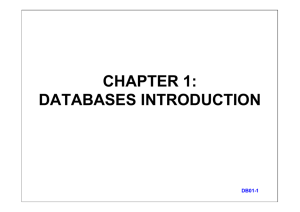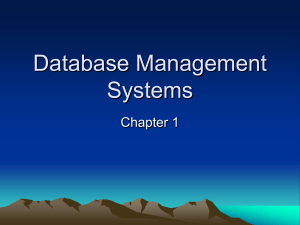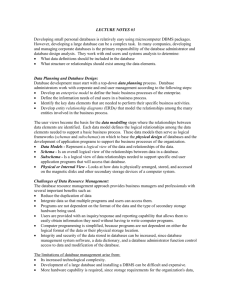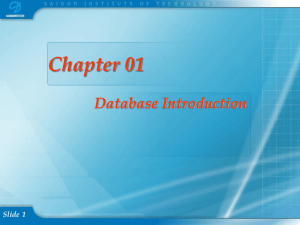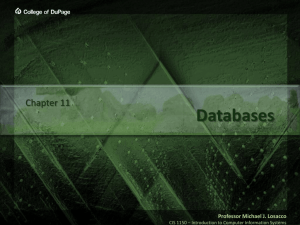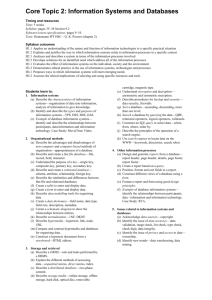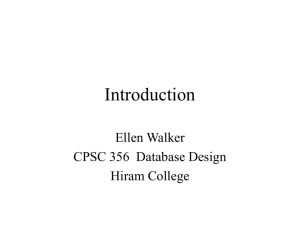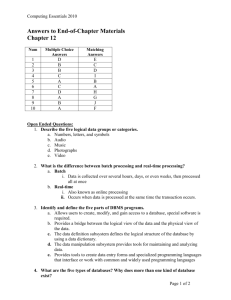MODERN DATABASE MANAGEMENT SYSTEMS
advertisement
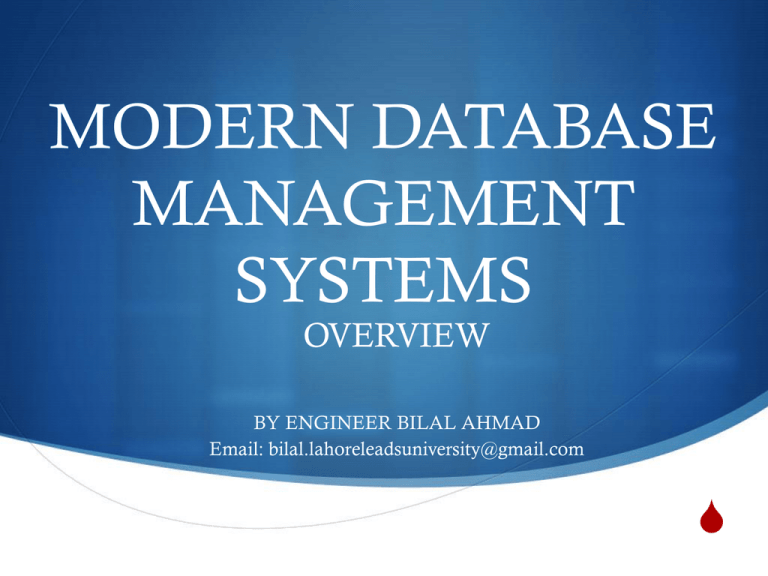
MODERN DATABASE MANAGEMENT SYSTEMS OVERVIEW BY ENGINEER BILAL AHMAD Email: bilal.lahoreleadsuniversity@gmail.com S TEXT BOOK Database Principles: Fundamentals of Design, Implementation, and Management Ninth Edition Carlos Coronel, Steven Morris, and Peter Rob Objectives You are expected to have clear concepts and an in depth knowledge to Design, Implement and Manage a Modern Database system. You also have to submit a research paper at the end of the course. It entirely depends on you. “An example can be consistency tradeoffs in Modern Distributed Database System Design”. You can work in groups should not be more than 3 students. After selecting the relevant research topic you than have to submit a proposal not more than 2 pages, (individually). It must clearly explain what are you doing? And how are you going to do this? Final submission of the research paper is due in week 12 till Thursday 9pm. Presentations schedule will be announced later on. The research paper has to be on modern standards. Both soft and hard copies should be submitted. Course Assessment: Assignments Quizzes Course Project Presentations) Mid Term Final Examination 7% 8% 15% (5% for 30% 40% OBJECTIVES S You will learn; S What is a Database and what is a Database Management System? S Why Database is a valuable entity for Decision Making? S What is a Modern Database System? S Design Importance of a Database System S The main components of the Database System and Main functions of Database Management systems (DBMS) Introduction S There are three critical aspects that you need to consider; 1. Design of a Database 2. Implementation 3. Management Why Databases? S They can solve so many problems that are encountered in Data Management. S Databases are used almost every where examples are Business, Research, Administration. S Can you now think of the differences between a traditional Database and a Modern Database System, any example? S The critical aspect is however to understand how Databases interact with other applications. Database Concepts S The benefits of DBMS are taken for granted by most of public. S It must have the ability to store/ access or change any information. S In 1970’s the Databases were very difficult to navigate and they were not flexible, one of the reasons might be that there were limited resources (Languages were not well developed) S The programmer should know what clients want as it is a time consuming and expensive process in the long run Examples of some Modern Database Systems. S In Business: S If you want to operate a Business what entities do you Know? S That very information should be available to Decision Makers. S You need to collect data, store data, manipulate, aggregate and Manage the Data. Database Design is Complex S Databases are very complex to examine because all database designs are effected by the real world transactions. S The way data is distributed and even increasing information cause severe problems. S Real scenarios are effected by; No of Users, Current Generation, Distributed Information Implementation of a Database System S Implementation of Database is based on SQL (Structured Query Management). The relevant information will be delivered later on that will include why SQL? What Modern Industries are using to implement a Database System. For the time being don’t worry and cheer up Database Management S Though it is a broad concept but the main and critical aspects are; S You should be able to administrate the database and should consider the security parameters. S It will be hardly expected from you if you join any industry that they will ask you to implement a database, almost all organizations in the world do have strong database systems, they need you to manage and understand the design concepts so that you should expand it if required! Yours favorite Database S Can you tell me what is your favorite Database System and why do you think it is one of the best? Data VS Information S What drives a Database Design YOU must know what is a Data? and what is an information? S Data: Raw facts, that has not been processed to reveal its meaning. Message, Bits, Frames without processing is classed as a Data. S Information: The result achieved after processing the data is called information. Mission accomplished once you know the meaning of Data, it is an Information. Data VS Information Continued S Data is building blocks of Information. S Information is produced by processing the Data and Information is used to reveal the Meaning of Data S Accurate, relevant and timely information is the key to make good decision making. S If an organization wants to survive they need to have good decision making. Challenge? S Can you think of one real time environment that has been strongly effected by the increase in the number of users and one real time environment that has not been effected? Work in the groups, you have 10 to 15 Minutes and than you have to come up with an example. Database; Introduction S Tell me whether or not the statement is correct, “Efficient Database Management required the use of a strong computer Database” S Database: Shared , Integrated Computer Structure that stores a collection of; End User Data and Metadata. End User data are raw facts for an interest of end users and metadata is data about data. In other words provides the characteristic and relationships of data Role of DBMS S An intermediary between the user and the database S Database structures are stored as file collection that can only be access through DBMS. S DBMS enables Data to be shared and it also integrates many users. Advantages of DBMS S Improved Data Sharing S Improved Data Security S Better Data Integration S Minimized data in consistency S Improved data access S Improved decision making S Increased end user productivity Group Activity S After considering the role and advantages of the Database Management system consider Google Database management system and demonstrate the Advantages and Disadvantages of Google. S You can form again a group of 3-4 students, you have 10 minutes think about it and present it. S After the discussion please write one to two pages report and submit it in 2 weeks from now. This is your assignment no 1 and it will give you 1 marks. Types of Databases S They can be classified according to the; -No of Users -Database Locations -Expected type and extent of Use Single user database will support one user at a time, example is Desktop database: A Single user that runs on PC Multiuser database supports multiple users at one time. Example is your library database. It is called as workgroup Types of Databases Continued S If the data is located a single site it is called Centralized Database S If the data is distributed across several sites they are called as Distributed Database S Company’s day to day operations are supported by Operational database also called as transactional or operational Database S For tactical or strategic decisions Data warehouse is used Types of Databases Continued S Unstructured data exist in their original state S Structured data result from formatting S Structure applied based on type of processing to be performed S Semi structured data have been processed to some extent S Extensible Markup Language (XML) represents data elements in textual format S XML database supports semi structured XML data
